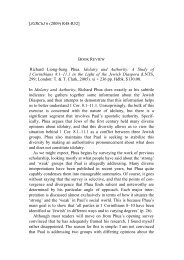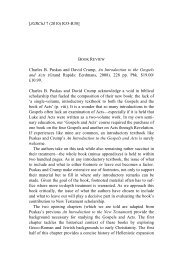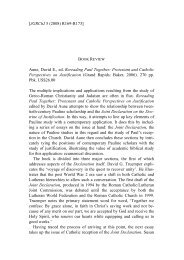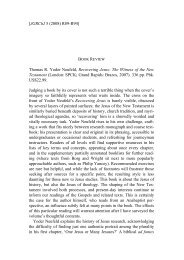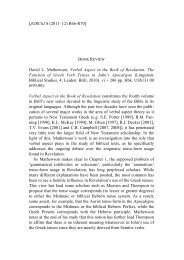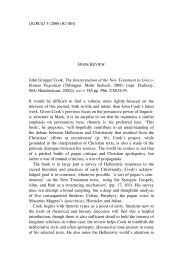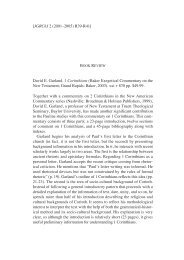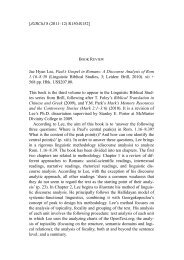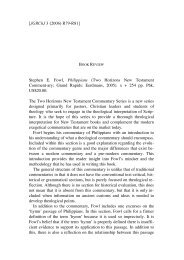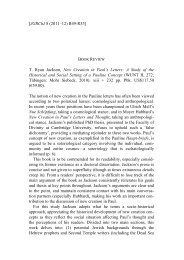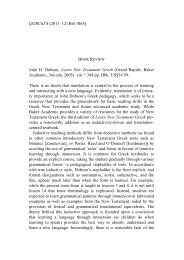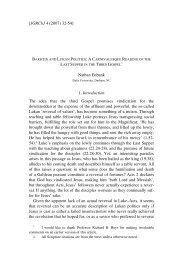The Politics of Ephesians and the Empire - Journal of Greco-Roman ...
The Politics of Ephesians and the Empire - Journal of Greco-Roman ...
The Politics of Ephesians and the Empire - Journal of Greco-Roman ...
Create successful ePaper yourself
Turn your PDF publications into a flip-book with our unique Google optimized e-Paper software.
Gupta & Long <strong>Politics</strong> <strong>of</strong> <strong>Ephesians</strong> <strong>and</strong> <strong>the</strong> <strong>Empire</strong> 117<br />
<strong>and</strong> political discourses more generally, <strong>the</strong> author <strong>of</strong> <strong>Ephesians</strong>, even<br />
when referring to spiritual powers, ‘may have thought specifically <strong>of</strong><br />
<strong>the</strong>ir earthly representatives’. 17<br />
<strong>The</strong> trumping nature <strong>of</strong> God’s work is evident in Christ’s position<br />
‘far above’ (u9pera&nw) every position <strong>and</strong> every ‘name being named’<br />
(1.21). <strong>The</strong> supremacy <strong>of</strong> Christ’s rule using u9pe/r or u9pera&nw continues<br />
in 1.22, 4.10 <strong>and</strong> 5.20, just as does God’s supremacy <strong>of</strong> power<br />
(1.19; 3.20) <strong>and</strong> ‘wealth <strong>of</strong> favor’ (2.7). Indeed, God <strong>the</strong> Fa<strong>the</strong>r is<br />
presented as <strong>the</strong> greatest benefactor (1.3-14; 2.4-10, etc.), which<br />
would have challenged any human or deity from making that claim.<br />
<strong>The</strong> possession <strong>and</strong> bestowal <strong>of</strong> wealth, grace/favor <strong>and</strong> mercy were<br />
especially <strong>the</strong> jurisdiction <strong>of</strong> <strong>the</strong> gods <strong>and</strong> <strong>the</strong> emperor. Indeed, it was<br />
argued that ‘Caesar owned all things’ (Seneca, Ben. 7.5.3); ‘whatever<br />
exists beneath Jupiter on high, Caesar possesses’ (Ovid, Fast. 2.138),<br />
‘for <strong>the</strong> emperor is <strong>the</strong> state’ (Ovid, Tris. 4.15). 18 Augustus listed his<br />
benefactions in thirty-five paragraphs in his Res Gestae, published on<br />
his dual-columned memorial. Philo (Flacc. 74) could call Augustus<br />
‘savior <strong>and</strong> benefactor’ (o9 swth\r kai\ eu0erge/thj Sebasto/j). <strong>The</strong><br />
role <strong>of</strong> being <strong>the</strong> greatest benefactor <strong>of</strong> <strong>the</strong> human race was continued<br />
in <strong>the</strong> Caesar Nero, who at Ptolemais in 60–61 ce was praised as<br />
‘<strong>the</strong> savior <strong>and</strong> benefactor <strong>of</strong> <strong>the</strong> inhabited world’ (tw~i swth=ri kai\<br />
eu0erge/thi th=j oi0koume/nhj). 19<br />
Fur<strong>the</strong>rmore, <strong>the</strong> ‘naming’ <strong>of</strong> Eph. 1.21 relates to social constructs<br />
<strong>of</strong> identification. 20 As Wesley Carr argues, <strong>the</strong> use <strong>of</strong> o1noma/o0noma&zw<br />
Biblical Studies; Leiden: E.J. Brill, forthcoming). For a0rxh/ <strong>and</strong> cognates see also<br />
H.J. Mason, Greek Terms for <strong>Roman</strong> Institutions: A Lexicon <strong>and</strong> Analysis (American<br />
Studies in Papyrology, 13; Toronto: Hakkert, 1974), pp. 110-15, 138-40, <strong>and</strong> for<br />
e0cousi/a, pp. 132-34. <strong>The</strong> term kra&toj ‘might’ in Eph. 1.19 is also used <strong>of</strong> ‘<strong>the</strong><br />
<strong>Roman</strong> imperium (power)’: to\ tw~n ‘Rwmai/wn kra&toj <strong>and</strong> to\ kra&toj to\ tw~n<br />
‘Rwmai/wn (Magie, De <strong>Roman</strong>orum, p. 58).<br />
17. Barth, <strong>Ephesians</strong> 1-3, p. 174; see pp. 171-76. Similarly, see P.T. O’Brien,<br />
<strong>Ephesians</strong> (Pillar; Gr<strong>and</strong> Rapids: Eerdmans, 1999), p. 144.<br />
18. Texts quoted from R. MacMullen, ‘Personal Power in <strong>the</strong> <strong>Roman</strong> <strong>Empire</strong>’,<br />
AJP 107 (1986), pp. 512-24 (520 n. 24).<br />
19. OGIS 668; cf. discussion in J.J. Collins, <strong>The</strong> Sibylline Oracles <strong>of</strong> Egyptian<br />
Judaism (Missoula, MT: SBL, 1974), pp. 81-82.<br />
20. Except for Acts 19.13 (in which <strong>the</strong> verb <strong>and</strong> noun are used with a magical<br />
sense), all o<strong>the</strong>r New Testament instances <strong>of</strong> <strong>the</strong> verb o0noma/zw involve social <strong>and</strong><br />
moral constructs <strong>of</strong> identification (Mk 3.14; Lk. 6.13-14; Rom. 15.20; 1 Cor. 5.11;<br />
Eph. 1.21; 3.15; 5.3; 2 Tim. 2.19).



